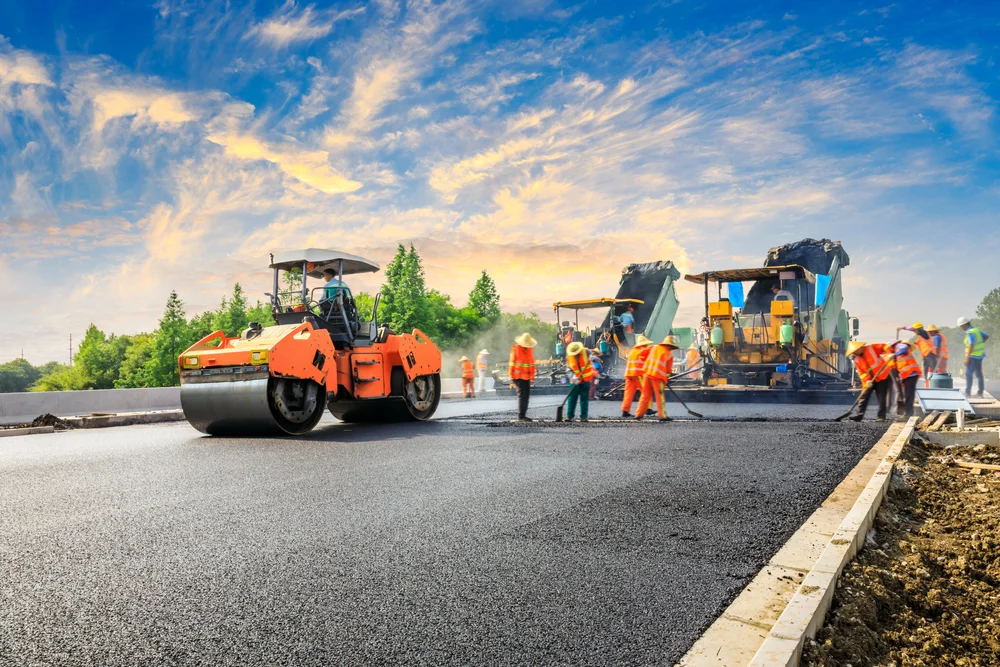Hot Mix Asphalt Paving: The Ultimate Option for Commercial Parking Lot Renovations
Hot Mix Asphalt Paving: The Ultimate Option for Commercial Parking Lot Renovations
Blog Article
Checking Out the Ecological Advantages of Warm Mix Asphalt
The use of Warm Mix Asphalt in infrastructure projects presents an engaging case for lasting advancement and environmental stewardship. By diving right into the detailed information of its manufacturing procedures and the innovative use recycled materials, a deeper understanding arises of just how this modern technology goes past mere surface applications. The environmental advantages of Hot Mix Asphalt extend far past first impressions, providing a nuanced viewpoint on exactly how this product can lead the method for a greener future.

Decreased Greenhouse Gas Emissions
The manufacturing procedure of Warm Mix Asphalt includes heating up the blend of accumulation and asphalt binder to high temperature levels. By incorporating recovered asphalt pavement and recycled asphalt roof shingles right into the mix, the requirement for virgin products is reduced, leading to power financial savings and reduced discharges linked with removal and processing.
Researches have actually revealed that Hot Mix Asphalt pavements have a smaller sized carbon footprint over their life process compared to other pavement alternatives. The longevity and recyclability of Warm Mix Asphalt further improve its ecological advantages by minimizing the demand for frequent upkeep or replacement, thereby preserving resources and lessening discharges related to restoration tasks.
Power Efficiency and Conservation
The production procedure of Warm Mix Asphalt not just lowers greenhouse gas emissions however additionally adds considerably to energy efficiency and conservation efforts. Energy efficiency is a crucial benefit of Warm Mix Asphalt manufacturing compared to other sidewalk types. The process involves heating the products at high temperatures to develop the asphalt mix, which needs much less energy than alternate approaches. Furthermore, the ability to reuse and recycle asphalt pavement additionally enhances energy preservation. By incorporating reclaimed asphalt sidewalk (RAP) into brand-new mixes, the market saves power that would have been required to produce entirely new materials. Moreover, the longevity of Warm Mix Asphalt lowers the regularity of upkeep and repair, resulting in long-lasting energy savings. This durability reduces the energy-intensive procedures associated with constant repairs and substitutes. Generally, Warm Mix Asphalt sticks out as an eco-friendly option that focuses on energy efficiency and conservation throughout its lifecycle.
Sustainable Pavement Solutions

One key facet of lasting pavement options is the use of recycled products such as recovered asphalt sidewalk (RAP) and recycled asphalt shingles (RAS) By integrating these products into the asphalt mixes, the need for virgin resources is minimized, leading to lower power usage and greenhouse gas discharges during manufacturing. Furthermore, the reuse of these products aids divert waste from garbage dumps, contributing to a much more circular and sustainable economic situation.
Moreover, lasting sidewalk options concentrate on maximizing pavement layout to enhance performance and longevity. Strategies such as warm mix asphalt (WMA) and rock mastic asphalt (SMA) improve the longevity and resilience of pavements, decreasing the need for constant repair work and replacements. By applying these cutting-edge approaches, facilities designers can produce pavements that not only fulfill high-performance standards however additionally lessen their environmental footprint.
Minimized Environmental Impact
With a concentrate on sustainability and eco-conscious methods, pavement remedies are developed to decrease the ecological impact of building and upkeep procedures. Warm mix asphalt, in certain, provides numerous benefits that add to minimizing the general ecological footprint of roadway infrastructure. One essential element is the recyclability of asphalt, which can be reused several times without endangering its high quality. This characteristic aids in saving all-natural sources and minimizing the quantity of waste sent out to land fills.
In addition, the manufacturing of hot mix asphalt sends out reduced levels of greenhouse gases compared to various other sidewalk materials, making it a more environmentally friendly alternative. The energy performance of asphalt plants has actually likewise boosted for many years, bring about lowered fuel intake and reduced discharges. In addition, the smooth surface area of hot mix asphalt minimizes rolling resistance for lorries, leading to lower gas usage and lowered air contamination from lorry discharges.
Payment to Environment Change Mitigation
Warm mix asphalt plays a crucial duty in mitigating environment modification with its lasting residential properties and lowered ecological influence. One considerable contribution to climate modification reduction originates from the energy effectiveness of warm mix asphalt production. Compared to various other sidewalk choices, the production process commercial parking lot paving for warm mix asphalt takes in less power and discharges reduced degrees of greenhouse gases, hence lowering its overall carbon footprint.
Additionally, hot mix asphalt's capacity to show sunshine, understood as albedo, helps in lowering city heat island impacts. By lessening warmth absorption and retention, warm mix asphalt pavements can decrease the demand for air conditioning in urban areas, subsequently decreasing greenhouse gas exhausts connected with energy intake for cooling down objectives.
In addition, the longevity and recyclability of warm mix asphalt additionally improve its climate change reduction abilities. Regrading. The lengthy lifespan of asphalt pavements reduces the demand for frequent repairs or substitutes, inevitably decreasing the carbon emissions linked to road upkeep tasks. Furthermore, the recyclability of asphalt materials decreases the need for virgin sources and decreases the ecological influence of pavement building and construction, aligning with sustainable practices for environment modification mitigation.
Verdict
Finally, the ecological benefits of Warm Mix Asphalt demonstrate its significant contribution to decreasing greenhouse gas discharges, conserving energy, and lessening environmental impact. This sustainable pavement remedy aligns with environment adjustment reduction initiatives, promotes resource preservation, and improves infrastructure growth. By using recycled products, energy-efficient production processes, and sturdy style, Hot Mix Asphalt plays an important role in promoting a much more eco-friendly technique to facilities building.
The production process of Hot Mix Asphalt includes warming the blend of aggregate and asphalt binder to high temperatures. By including redeemed asphalt sidewalk and recycled asphalt roof shingles into the mix, the demand for virgin materials is decreased, leading to energy financial savings and lowered discharges associated with extraction and handling.
One secret aspect of lasting sidewalk remedies is the usage of recycled materials such as reclaimed asphalt pavement (RAP) and recycled asphalt tiles (RAS) Techniques such as warm mix asphalt (WMA) and rock mastic asphalt (SMA) enhance the durability and strength of sidewalks, minimizing the requirement for regular repair services and substitutes. Compared to various other pavement choices, the production procedure for hot mix asphalt eats less power and emits lower degrees of greenhouse gases, thus reducing its overall carbon impact.
Report this page